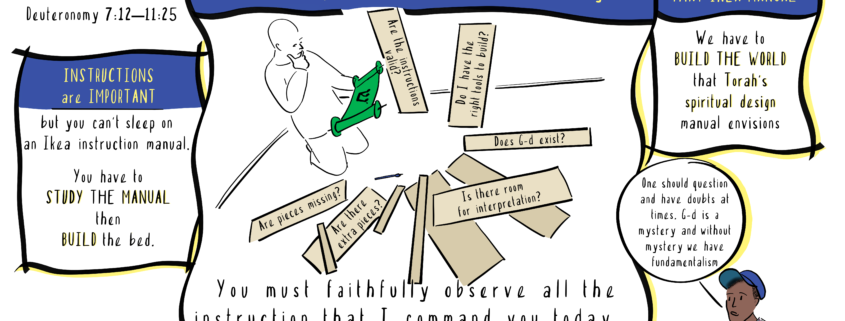The Torah of Ikea

Part of a yearlong Toah series on building and builders in Jewish spiritual life.
I’m a stereotype. Like many people (and especially some men), I have an aversion to following written instructions. I tend to believe that I can figure things out and build things all on my own instinct and intuition. Ikea furniture assembly instructions were for other people.
On my better days, my spiritual self knew how wrong I was.
Among Jewish tradition’s many wisdom teachings is that sometimes we need instructions. Instructions don’t suggest that any of us individually lack intelligence or creativity. Rather, instructions are important because individual intelligence and creativity aren’t enough for a diverse collective to build and maintain a thriving community.
This week’s Torah portion (Eikev) records Moses telling all of Israel on God’s behalf: “You must faithfully observe all the instruction that I command you today, so that you will thrive…” (Deut. 8:1). This teaching is directed both to the individual and the community. When we follow these Divine instructions individually, the collective prospers. This is a crucial concept of Judaism. Our individual actions should reflect our responsibility to uplift other members of the community.
Maybe this communitarian approach wasn’t obvious to our spiritual ancestors. Accordingly, Torah offered both carrots and sticks as incentive to follow God’s instructions – “blessings” of peace and prosperity if we followed those instructions, “curses” of strife and want if we didn’t.
On the “blessings” side, probably none of us can claim enough individual intelligence and creativity to promote a good life of prosperity, justice and security for all. Torah and spiritual wisdom traditions offer the time-tested expertise that our collective needs to build the most fair, safe and just world possible. On the “curses” side, we needn’t lay society’s ills at the proverbial feet of a retributive God: if only we’d followed instructions for building a fair, safe, just world!
Torah does require observance of some rules that are beyond our comprehension. Jews merit Torah because of our willingness to naaseh v’nishmah, to do and then listen. This reflects our faith that the objective of Torah is to construct a fair, safe and just world.
There are times when Ikea instructions reminded me of Egyptian hieroglyphics and with, at best, an implied promise of only a slightly wobbly bedroom set. Ikea instructions didn’t explicitly lay out “blessings” of compliance and “curses” so I proceeded by building on my own intuition rather than following directions. Even so, I should have followed those instructions as best I could: it would have saved me hours of frustration.
Moses knew that we might prefer to follow our own designs rather than following instructions. He knew that we might get comfortable in our homes and lives, prideful in our capacity to pursue wealth and power on our own. In Torah’s words, we’d forget God and God’s instructions (Deut. 8:15-17).
Remember mom’s advice to hold onto the instruction manuals for kitchen appliances and home furnishings? Mom was right, and so is Torah. When things break, instruction manuals can help. When the world feels broken, the instruction manual we call Torah can help guide repairs: feed orphans, care for widows, befriend strangers, protect the land, nourish justice. Teach children these instructions so their wisdom may endure for all.
One more thing: instructions are important, but it’s about the building. We can’t sleep on an Ikea bed assembly instruction manual: we actually have to build the bed. Same with Torah. The world can’t thrive on study and spiritual aphorisms alone: we actually have to build the world that Torah’s instruction manual envisions.
Instructions don’t guarantee perfection: bad things happen to good people, and even the most dogged and diligent build-it-yourselfer might end up with a rickety bookcase. And instructions don’t ask us to ignore our intelligence and creativity: society needs more out-of-the-box thinkers and courageous people marching to the beat of their own drummers. But Torah’s tried and true spiritual designs have proved their worth over time – if only we’d follow the instructions.


By Rabbi Evan J. Krame. Sketchnote by Steve Silbert.









